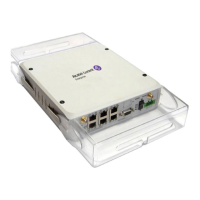Port Features
Page 32 7705 SAR OS Interface Configuration Guide
Port Features
• Multilink Point-to-Point Protocol
• Inverse Multiplexing Over ATM (IMA)
• Network Synchronization on Ports
→ Network Synchronization on T1/E1 and Ethernet Ports
→ Network Synchronization on SONET/SDH Ports
• Flow Control on Ethernet Ports
• Ethernet OAM
• MTU Configuration Guidelines
• Deploying Preprovisioned Components
Multilink Point-to-Point Protocol
Multilink point-to-point protocol (MLPPP) is a method of splitting, recombining, and
sequencing packets across multiple logical data links. MLPPP is defined in the IETF RFC
1990, The PPP Multilink Protocol (MP).
MLPPP allows multiple PPP links to be bundled together, providing a single logical
connection between two routers. Data can be distributed across the multiple links within a
bundle to achieve high bandwidth. As well, MLPPP allows for a single frame to be
fragmented and transmitted across multiple links. This capability allows for lower latency
and also for a higher maximum receive unit (MRU).
Multilink protocol is negotiated during the initial LCP option negotiations of a standard PPP
session. A system indicates to its peer that it is willing to perform MLPPP by sending the
MP option as part of the initial LCP option negotiation. The system indicates the following
capabilities.
• The system offering the option is capable of combining multiple physical links into
one logical link.
• The system is capable of receiving upper layer protocol data units (PDUs) that are
fragmented using the MP header and then reassembling the fragments back into the
original PDU for processing.
• The system is capable of receiving PDUs of size N octets, where N is specified as
part of the option, even if N is larger than the maximum receive unit (MRU) for a
single physical link.
Once MLPPP has been successfully negotiated, the sending system is free to send PDUs
encapsulated and/or fragmented with the MP header.
